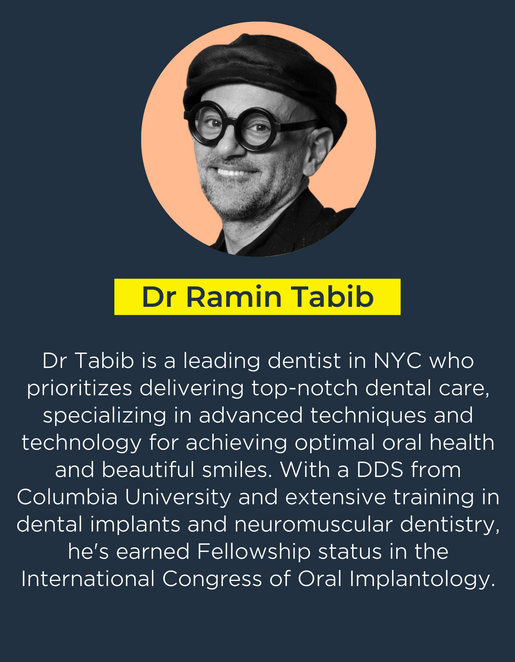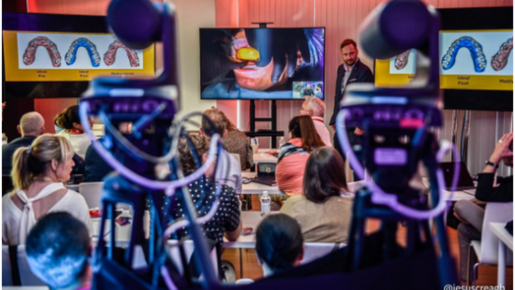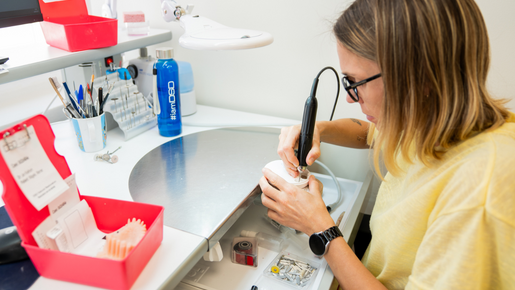In the latest episode of the Smile Business Diaries podcast, Maria Cabanellas was joined by Dr Ramin Tabib, a leading dentist in New York City, to talk about the unique challenges of starting a dental practice from scratch with his wife, Dr Elisa Mello.
To start, Dr Tabib talked about his journey to date in building the practice he owns with Dr Mello and how having a small clinic can be a good thing:
“I think if you’re starting out, try to practice in a concentrated, controlled, small environment because it really helps you be a better dentist. I feel like when you have a large office, there are all these areas where you can hide. But in a small office, you can’t hide from patients. You can’t try to avoid certain situations. You need to interact with people. It teaches you to be more interactive with your team and your patients. I feel like in a large office, I would probably initially as a student, just graduated and started my practice, get lost. ‘Crazy patients here, I’ve got to hide myself’ - you can’t do that, you have no ability to do that.”
Music and dancing are a cornerstone of this New York dental clinic when it comes to creating a fun and warm environment for both the team and patients. Maria asked Dr Tabib about the ‘Friday Dance’ and how it came about.
“My social media, it sort of grew out of my need to be a comedian all the time and having fun. I used to make a lot of these videos that are just humorous, with patients even. An idea came to my head like ‘let’s do this’ and I prepped the patient and I had my assistant start filming it. I started doing the dance and then it became like a Friday dance - so every Friday I have to have a dance put up. It's silly but sometimes you just have to be humble and don’t fear how you're presenting yourself, be yourself.”
And finally, what is one of the most important things he’s learned in his career to date?
“One of the most important things that I’ve learned - and I’ve been around the block a few years now - it’s your desire to serve people rather than your desire to compete with others, is what’s going to set success for you. Being competitive can be very tiring - you’re constantly using others as your own barometer. And I’m not saying that I’m so perfect that I don’t do that, and I did that and I was always comparing myself to this person, to that person, and to what end?
There’s always someone better than you, there’s always someone selling a lot more dentistry, making a lot more money. But where is your gratification? Where is your purpose in life? I think that when you have a sense of purpose and it’s really to serve people, you know that what you’re doing is impactful.”
Listen to the episode in full
Listen to the full episode now on Spotify, Apple Podcasts or YouTube to hear more about Dr Ramin Tabib's story and practice life. You can also read the full transcript below.
About the episode guest

This transcript has been reviewed by AI and may contain inaccuracies
Maria Cabanellas: Welcome to another episode of Smile Business Diaries. This time, it's my great pleasure to welcome Dr. Ramin Tabib. In our conversation, he talks about how having a small clinic can be a good thing, how humor can deepen your connection with your patients, and how Fridays are for dancing. Now, let's jump right in.
Maria Cabanellas: All right, so we have Dr. Ramin Tabib, a leading dentist in New York City, prioritizing delivering top-notch dental care, specializing in advanced techniques and technology for achieving optimal oral health and beautiful smiles. With a DDS degree from Columbia University and extensive training in dental implants and neuromuscular dentistry, he's earned fellowship status in the International Congress of Oral Implantology. Committed to patient education and integration into his practice, he fosters a culture of excellence and innovation. Beyond dentistry, Dr. Tabib’s diverse interests include his role as a resident DJ, contributing to a welcoming atmosphere in his office. Welcome, Dr. Tabib. How are you?
Dr. Ramin Tabib: Good morning! How are you, Maria?
Maria Cabanellas: Amazing, amazing. It's wonderful to have you here. You are definitely an inspiration, not just in dentistry but in the world. You know, if anyone follows you, they know you are quite the character. You've got a lot under your belt as far as life, dental excellence, and just being in the heart of New York City. You’ve got a great story to tell us, and so I want to welcome you.
Dr. Ramin Tabib: I have it all put together! I am the epitome of excellence.
Maria Cabanellas: Exactly, no issues at all, you’re just the poster child. So, please share with us your story. How did you get to where you are today? How can you deliver some information to those who would like to learn from you and know your secrets? Tell us your secrets!
Dr. Ramin Tabib: Okay, you got it. So, the way I started my practice was, I would say, a non-traditional method. Usually, you look for a practice to purchase, and you kind of get in, and there’s already an influx of patients. We decided to do it differently. By "we," I mean me and my wife, Dr. Elisa Mello. We decided to build a practice the way we wanted it, to see the type of patients we wanted to see. So, we had this grand idea: let’s just start from scratch—with no patients. And that’s what we did.
I think it has its advantages and a huge level of disadvantages. You have basically no income initially because your first patients are your family members, and they expect to pay nothing. So, that’s how we started. We were also working for another dentist for a while, trying to learn our skills. I think we put a couple of years into that, and we were able to develop our skills. That’s so important when you first get out—to hone your skills without any repercussions of trying to run a business and do everything else at the same time.
We did that, and then we started our practice on a Saturday, while we were working during the week for someone else. It was like a Saturday practice. We thought it was so innovative—like, "Oh, you can come in on a Saturday!" So, we worked Monday through Friday and had a Saturday practice. It was definitely a tough go, but we slowly developed it. The fact that we were a dual-income household really helped a lot. We were able to support each other as we slowly developed this over the years to a point where we are now comfortable with patients coming in. We don’t have to hustle as much. That’s how we got started.
Maria Cabanellas: Wow, that’s amazing. Would you recommend it to others?
Dr. Ramin Tabib: I don’t recommend it for everyone. We also practiced in a very tiny office—it’s 700 square feet. Space is a premium in Manhattan, so working in a small environment was helpful. The reason I say that is because, you know, you can go into a 3,000 or 5,000-square-foot office and have all the space in the world, but it creates bad habits. It creates clutter. You start to not see your environment as a space you can control in a way that you aren’t burdened by stuff being everywhere and not knowing where things are.
If you can work in a very tight environment, it really sets you apart. It helps with organizational skills. When you expand and get bigger—which we are in the process of doing now—you have those organizational skills honed, and you can utilize space very well. Better than anyone else could.
Maria Cabanellas: So, if you were to go back, what would you do differently in your journey?
Dr. Ramin Tabib: That’s a good question. I think I would want to have probably started with a small practice that had some income coming in. Maybe that would have helped. But honestly, I think we did it the right way for us. So, I don’t feel like I would change much. I’m not a very nostalgic person. I don’t look back and think, "What should I have done differently?" I’m always a forward thinker.
Maria Cabanellas: That’s a wonderful ability, to be able to say that honestly.
Dr. Ramin Tabib: Every decision has its struggles, but if you look back and say, "Oh, I should have done this differently," you’re going to discourage yourself. You’re going to "should" yourself to death.
Maria Cabanellas: That’s so true. You also made an interesting point about the size of your office. You still practice in a relatively small office compared to many in the United States. Do you believe that the size of the office matters, whether you’re starting out or in the middle of your career? How does this affect your business overall?
Dr. Ramin Tabib: Good question. The size of the office definitely mattered to us. Whether someone else, working in a different part of the country, would feel that way is probably not for me to say. For us, the size of the office was critical because we couldn’t afford a bigger space. Everything in New York is so expensive.
I think if you’re starting out, try to practice in a concentrated, controlled, small environment. It helps you be a better dentist. I feel like when you have a large office, there are areas where you can hide. But in a small office, you can’t hide from patients. You can’t avoid certain situations. You need to interact with people. It teaches you to be more interactive with your team and your patients. I feel like in a large office, I would have gotten lost. I would have tried to hide when things got crazy, but in a small office, you can’t do that.
Maria Cabanellas: So, in a way, it was a blessing to have a smaller office and develop those communication skills, seeing the patient as a person rather than just another number coming through the door.
Dr. Ramin Tabib: Exactly.
Maria Cabanellas: One of the important things you’ve mentioned is your desire to serve people rather than compete with others. That’s such a powerful mindset.
Dr. Ramin Tabib: Yeah, being competitive can be very tiring. You're constantly using others as your own barometer. There’s always someone doing better, selling more dentistry, or making more money. But where is your sense of gratification? Where is your purpose in life? When your sense of purpose is to serve people, and you know that what you're doing is making a difference in someone’s life, that becomes your driving force. Competing with everyone else? That’s not it for me anymore. I stopped doing that years ago.
Maria Cabanellas: So, when you started out, that’s where your mindset was—competing with others. At what point did you figure out, "I’ve got to change this mindset and think differently"?
Dr. Ramin Tabib: The competitive nature that I always had probably helped me in some ways because I wanted to do better, but at some point, it became a hindrance. I started comparing myself to many people, and it wasn’t serving me. I was getting frustrated all the time. Eventually, I realized that competing with others was unhealthy and not a way to practice.
Now, I channel my competitive nature into things like running. I love running, and it brings my tension levels down. At the end of a busy, tiring day, I try to get out there and run. That’s my competition with myself.
Maria Cabanellas: Absolutely. That’s such an important shift. I follow a lot of athletes and successful people, and there’s a consistent message: at the end of the day, we don’t talk about the struggles, we talk about the accomplishments. When you’re at the end of your life, you won’t be talking about that difficult day or week. You’ll remember what you achieved and contributed to the world.
Dr. Ramin Tabib: Totally. And here’s another thing: about 90% of the things we worry about never happen. We worry about things every day, but if you kept a journal and wrote down everything you worried about, then looked back at it six months or a year later, you’d realize that most of those worries were unfounded.
Maria Cabanellas: That’s a great point.
Dr. Ramin Tabib: Most of the things we worry about just disappear. They don’t even materialize into anything real. You worry about how you’re going to survive in a downturn economy, but then you retool yourself and make adjustments. That’s human nature.
Maria Cabanellas: For those doctors out there who constantly struggle with making decisions, especially when things aren’t going well—like the economy is hurting them, they don’t have enough patients, or they’re dealing with staffing issues—what advice would you give them when they need to turn those challenges into solutions?
Dr. Ramin Tabib: Well, one thing is, the way we started our practice was in a completely different environment than it is now. The amount of debt that kids are coming out with now is astronomical. I mean, half a million dollars in debt just to become a dentist—that’s astounding. And to know you have that burden while trying to start a practice? It’s daunting. For some people, it forces them to make unsavory decisions—things they wouldn’t even consider if they were financially comfortable. It’s a very challenging time, and I get that. We had our difficult moments, especially in the beginning, where money wasn’t coming in.
You just have to persevere and have a really tough skin. Be very frugal in the beginning. Don’t waste money on things that don’t serve you economically. Be critical of every dollar you spend—whether it’s on technology or anything else. In the early days, I thought technology was going to sell the practice: "If I have the latest tech, people will see how advanced we are." But now, I won’t invest in anything unless it serves my patients and genuinely improves my dentistry—not just to impress them. I used to think, "I need all this tech to impress people," but now I focus on whether it’s really making a difference in the quality of care.
Maria Cabanellas: So how did you make these decisions? It’s one thing to say, "Be frugal and make smart investments," but how do you actually figure out what’s the best choice when you’re stuck with limited funds and can only make one move?
Dr. Ramin Tabib: I’m lucky because I’m not terrible with finances, but I’m not the person to rely on for financial decisions. My wife, Dr. Mello, handles that. Whenever I want to make a purchase or invest in new equipment, we have a dialogue: "Does this make sense now? Is it the right time? How is it benefiting us?" That ability to bounce ideas back and forth with her is key. Having someone else to rely on for decisions is crucial. I can’t imagine doing this all by myself as a solo practitioner. You need to bounce ideas off someone, or it can become very challenging.
Maria Cabanellas: Would you say your support system is one of the key factors in your success?
Dr. Ramin Tabib: Totally. Having a good support system helps a lot. If you’re a solo dentist, I’d suggest finding a really good friend in the profession who you can talk to and share your bad days with. You can’t internalize everything. It can be really tough as a solo practitioner if you have no one to talk to about your struggles.
Maria Cabanellas: And if someone doesn’t have a spouse or family to lean on, what would you suggest? How should they build a support system in the dental community?
Dr. Ramin Tabib: Definitely. I have a couple of really good friends in dentistry, and I can tell them anything—whether it’s about my life, my practice, or a difficult patient. Having a mentor is key. I think it’s more important now than ever because social media can overwhelm you. It’s easy to get caught up in comparing yourself to what you see online, but real, meaningful connections with people are so much more important. Sometimes, the constant scrolling on social media makes you feel worse, and you lose perspective. Having genuine relationships with people in the profession is invaluable.
Maria Cabanellas: That’s so true. Tell me more about your journey to the United States. Where are you originally from, and how did you come to practice in New York City?
Dr. Ramin Tabib: I’m originally from Iran. I came to the U.S. when I was 14 during the Iranian Revolution. It was a very difficult time, and for me, as a Jewish family, leaving the country became imperative. We had some family here, so we came to the U.S., and I went to school here. I eventually went to dental school at Columbia University, and that’s where my journey in dentistry began. My wife, Dr. Mello, and I didn’t meet until after dental school, even though we graduated the same year. She went to NYU, and I was at Columbia.
We met while applying for a job at the same practice. We were both in the waiting room, applying for the same position. It was pretty funny. And guess what? We both got the job. That’s how we met, and from there, we became friends and eventually partners—both personally and professionally. We started our practice together, first as a one-day-a-week practice while working elsewhere. Eventually, we both left our jobs and built the practice from there.
Maria Cabanellas: That’s an amazing story. You both started as associates and saved up to open your own practice. It’s such a relatable journey. How are things running for you now, and what do you feel are the most important tools you rely on in your practice today?
Dr. Ramin Tabib: When you say "tools," I wouldn’t necessarily call them physical things. For us, non-negotiables include things like a daily huddle. We meet every morning to go over the day. That’s a must. We also keep a very organized, uncluttered space. I hate clutter, and I’m really strict about that. It’s probably a dentist thing. I don’t know, but when you come to our office—although it’s small—you’ll see that everything is in its place. No mess, no clutter. That’s a standard I won’t compromise on.
Another important thing is energy. Sometimes you come in tired, but you can change your state. Tony Robbins talks about this—changing your emotional state through movement. I always tell my team that if they’re not feeling great, go into a room, jump up and down, and change your energy. It makes a difference.
Maria Cabanellas: I love that. And what’s this about the Friday dance? Tell us more about that.
Dr. Ramin Tabib: Oh, yeah, the Friday dance! That started with my social media presence. I’ve always had this need to be a comedian and have fun, so I started making funny videos—sometimes with my patients. One day, I started doing a little dance in the office on Fridays, and it just stuck. Now, every Friday, I have to post a dance video. It’s silly, but it’s fun, and people love it. You just have to be yourself and not be afraid of what others might think. Authenticity goes a long way. Patients can tell when you’re not being genuine, so it’s important to embrace who you are.
Maria Cabanellas: That’s such a unique way of connecting with people. If your team or others ever told you, "Don’t dance like that, it’s not professional," how do you respond when it goes against who you are?
Dr. Ramin Tabib: Oh, believe me, in the beginning, my team was embarrassed. They cringed and walked away, like, "What’s he doing now?" But after a while, they got used to it. Now, they expect it. They’re even excited about it, like, "Oh, you’re going to do the Friday dance? I’ll film it!" It’s become a thing. When you’re real, people get on board. If you’re forcing it, they know. But when it’s genuine, they respect it.
Maria Cabanellas: That’s such a great leadership style—using humor to create a positive atmosphere in the office. What would you say to other dentists who want to be better leaders for their teams?
Dr. Ramin Tabib: Leadership comes down to respect. You have to deeply respect the people on your team. Everyone has their own story, their own background. When you show real respect, your team will follow you. And humor is key. It helps relieve stress and creates a bond. If you take everything too seriously, it becomes overwhelming. Take your work seriously, but don’t take yourself too seriously.
Maria Cabanellas: That’s a fantastic perspective. As we wrap up, is there anything specific you’d like to share with our listeners? Any final message?
Dr. Ramin Tabib: I’d say, always remember your successes. Whenever you’re having a tough day, think about a patient whose life you transformed. I always think of Sarah. She was terrified of dentistry, but we helped her, and that’s imprinted in my mind. You’ll always have patients that don’t like you, and that’s okay. Don’t take it personally. We worry so much about bad reviews, but it’s important to focus on the good.
Maria Cabanellas: That’s such great advice. Thank you so much for sharing your story and wisdom with us today, Dr. Tabib. How can people get in touch with you if they want to learn more?
Dr. Ramin Tabib: I’m active on Instagram—@nycsmiledesign—so that’s a great way to reach out. Our office is on 84th Street, between Fifth and Madison, and we’re moving to a bigger space soon. I’m always happy to connect and talk to people.
Maria Cabanellas: That’s wonderful. Thank you again for joining us, and I’m sure we’ll have another conversation soon!
Dr. Ramin Tabib: Thank you so much, Maria. It was great talking to you.



